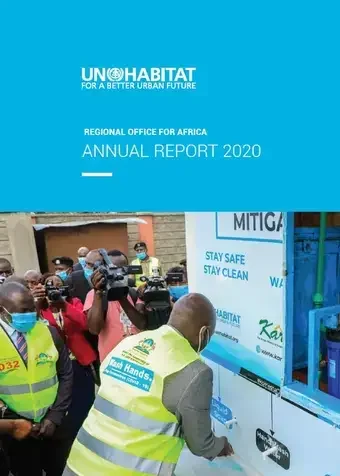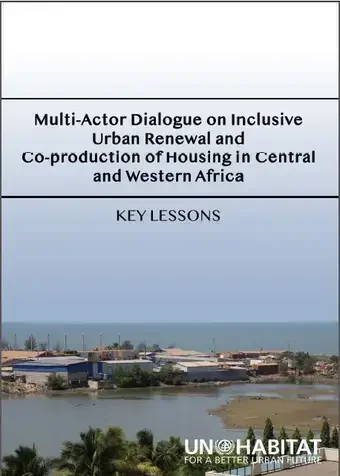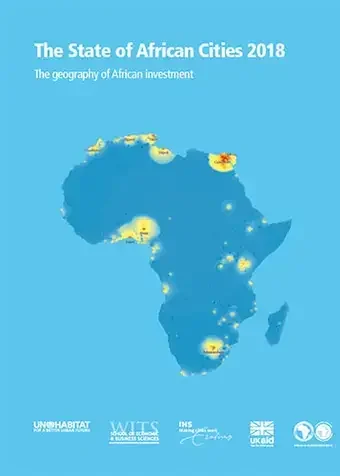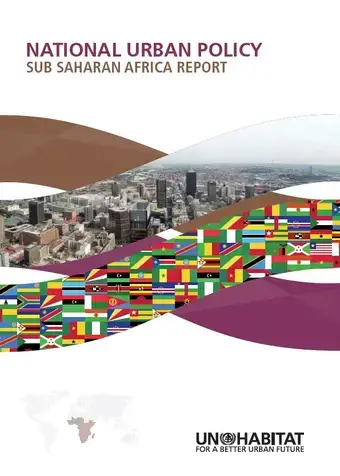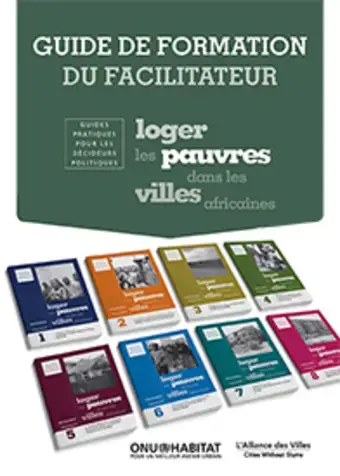The State of African Cities 2018 - The geography of African investment
Other documents
UN-Habitat continues to focus on providing support to human settlements and sustainable urbanization priorities to the Government of Ghana within the framework of several frameworks including; National Coordinated programme of Economic and Social Development Policies (2017-2024), United Nations Sustainable Development Partnership (2018-2022), New Urban Agenda, Africa Agenda 2063 and the sustainable Development goals.
UN-Habitat Ghana works with National Government (mainly through the Ministry of Local Government and Rural Development and Ministry of Housing), local authorities, civil society groups and communities through different programmes and projects.
Urban numbers
Challenges
According to Ghana Statistical service, the country’s estimated population at 30,280,811 out of which 54.8% of the population lives in urban areas. This implies the country is rapidly urbanizing. At an estimated average urban growth rate of 4.2%, Ghana’s urban population is expected to 65% by 2030. This process of urbanization has been characterized by the predominance of few large urban centres which have expanded considerably to the detriment of other small sized localities.
These cities are characterized with slums most notably with inadequate drinking water, sanitation, poor structural quality of housing and insecurity tenure and often resembling squatter settlements. A rapid inventory of all slum communities and pockets within the AMA indicate that there are about 78 slum communities in Accra (UN-Habitat, 2011) and an estimated 45% of Ghana’s urban population now resident in slums (UN-Habitat, 2009).
Within the United Nations Ghana Country Team (UNCT), UN-Habitat is collaborating with UNICEF, UNDP, WHO in implementing the joint WASH programme in Disaster Prone Communities in Northern. Furthermore, UN-Habitat is partnering with WHO in implementing the Urban Health Initiative in Accra.
UN-Habitat works with the Habitat Agenda Partners to provide the inclusion of the New Urban Agenda principles in the development of the country. UN-Habitat has been engaging in community driven initiatives such as the Participatory Slum Upgrading Programme which has seen enormous changes in livelihoods of the people of Ga Mashie especially through the community fund and strengthened the country’s capacity on slum upgrading.
UN-Habitat contributed to the development of the planned city extension framework to ensure the protection of land allocated for urban development and avoid urban sprawl and encroachment. This was done in partnership with the Ningo Prampram and other partners.
UN-Habitat also seeks to strengthen partnerships for a new African agenda through policy dialogues
Legacy content
UN-Habitat projects in Ghana
Planned City Extension for NingoPrampram
The project is developing a vision and an urban concept for the Planned City Extension of Ningo-Prampram. It brings together national government and state agencies, private investors, local chiefs and communities to discuss and agree on the future of Ningo-Prampram. The initiative has been welcomed by the Ministries and the National Development Planning Corporation, and it is now one of several National Priority Projects with Presidential support and a budget allocation for development and implementation from 2016 onward.
Project Duration: 2014 - ongoing
Value USD: Seed capital 100,000 USD
Donor: Booyoung Creative Industries
Partners: National government, National Development Planning Corporation Local Government of NingoPrampram
Water, Sanitation and Hygiene in Disaster Prone Communities in Northern Ghana
Objective of the project
- To implement resilient WASH solutions and reduce the number of people in disaster prone communities in the 3 Northern Regions without safe drinking water, basic sanitation facilities and hygiene services
- To promote education programmes and awareness of hygiene practices to improve the sanitation and health conditions in the beneficiary communities and schools
- To enhance regional and local capacity in the beneficiary communities to sustainably manage the WATSAN facilities and related services to be put in place.
- To contribute to measures that enhances the preparedness to disasters and minimizes future risks in the communities.
Methodology
The envisaged actions under the initiative will be in line with the relevant National strategies and plans on disasters in human settlements, water supply and sanitation. A solid base-line study will be undertaken to establish the status of the prevailing situation on the ground, identify any potential constraints, and to assess preliminary elements for consideration to ensure resilient WASH systems appropriate for the context of the disaster prone communities in the three Northern Regions. The following will be undertaken:
- Facilitate the process for agreeing on criteria for the selection of beneficiary disaster prone communities and organize the selection in consultation with the regional/district authorities and communities
- Undertake a baseline study of the 3 Northern Regions (including consultations with districts and communities) to collect relevant baseline information on disaster preparedness and WASH status of the beneficiary communities disaggregated by gender. This will involve:
- Identify resilient strategies and technologies appropriate for the communities in the 3 regions including emergency WASH kits and logistics for periods during disasters
- Based on the information from the baseline study and the identification of resilient strategies and technologies, make recommendations for resilient WASH solutions for locations (including the safe havens to be agreed on jointly with NADMO) that require resilient technology options based on the terrain characteristics of these locations;
- Establish a database on the services and prepare inventory of the WASH needs focusing on resilience and the specific circumstances of vulnerable, marginalized and excluded groups;
- Review minimum standards for WASH interventions and indicators with due focus on resilience.
- implement resilient WASH facilities and systems in schools, communities, and households in the beneficiary communities
- Appraise the potential capacity needs and awareness gaps in the communities and develop plans for:
- Institute measures to ensure post project sustainable management and operations of the resilient WASH facilities to be made available from the project interventions. This may be in the form of a sustainability protocol between the MLGRD as the lead GoG institution and the District authorities, to be monitored over a period after the project has been completed. The necessary resources to operationalize the sustainability protocol should be considered.
- Incorporate strategies and approaches into the National and Regional EPRPs and other strategic documents
- Service sectors covered by the project include: Water, Sanitation, Solid Waste management, and Environment
- Duration: June 2014 to May 2017
- Value: Can$ 9,373,310
- Donor: Foreign Affairs, Trade and Development, Canada (DFATD)
- Implementing Partners: UN-Habitat, UNDP, UNICEF, WHO, The Ministry of Local Government and Rural Development (MLGRD), Ministry of Water Resources Works and Housing (MWRWH), National Disaster Management Organization (NADMO), Coalition of NGOs in Water and Sanitation (CONIWAS)
Participatory Slum Upgrading Programme
The Participatory Slum Upgrading Programme aims to strengthen community, city and national key stakeholders’ capacities in participatory slum upgrading in Ghana, particularly within the pilot region of Accra Metropolitan Authority (AMA), thus adding value to the development of policy, institutional, legislative, and financial frameworks. Ga Mashie slum has been chosen to demonstrate the PSUP methodology within the framework of the citywide slum upgrading and prevention strategy that was started in Phase 2.
In general the Country Team aims to contribute to the development a national slum upgrading and prevention strategy through lessons learnt from the multi-stakeholder pilot programme in Ga Mashie while improving inter-sectorial coordination on slum upgrading and prevention programmes and activities at both national and local levels. It is hoped that in engaging the various stakeholders at different levels will result in an increase in resources allocation for slum upgrading prevention at both national and local government levels and also allow the mainstreaming of slum upgrading and prevention into the medium term development plans and budgets by the Metropolitan assembly of Accra and others that replicate the PSUP. The successful implementation of the pilot project by AMA will facilitate the development of a citywide Slum Upgrading Strategy and replication of projects and eventually scaling up nationally.
- Implementation Phase: Phase III
- Duration: 2008 – December 2015
- Value: US$900,000
- Donor: European Commission and, the Africa, Caribbean and Pacific Secretariat
UN-Habitat interventions
- Participatory Slum Upgrading Programme (PSUP): UN-Habitat has been supporting the Government of Botswana in the development of Housing policies, improving livelihoods through normative work and projects as well as strategies to address slums. The government supported in developing urban profiles for various towns including Gaborone. The funding is by the European Commission and community management funds.
- SDG Monitoring: UN-Habitat availed funds to monitor SDG 11 in Botswana which was selected as one of the pilot countries in Africa. Trainings were held for the national and local governments. The interventions will be used to achieve SDG 11 in Botswana.
- UN-Habitat Country Programme document: The Government of Botswana has already highlighted priority areas for the country programme. The process will be finalized once the signing of the MOU is completed for the Government to allocate financial resources for the development and the implementation of the UN-Habitat Country Programme.
Urban numbers
Challenges
In Botswana, the increase of urbanization rates is mainly determined by two phenomena: the rural to urban migration typical of dry lands where livelihood opportunity in the countryside are more and more scarce because of water scarcity, and the peri-urban migration. In general, the country has seen its population concentrating in urban areas according to their vocation.
Towns like Serowe and Palapye have been attracting population because of their concentrated employment opportunities mainly associated with services and industries. Maun and Kasane, being the tourism hub of the country, have seen growing urbanization rates associated with employment within the tourism sector. The construction of the trans-kalahari highway and the trade exchange at the gate with Namibia contributed to the accelerated growth of Ghanzi’s town.
Gaborone’s urban growth has been mainly characterized, on the other side, by the peri-urban migration phenomena. Peri urban areas in Botswana play a vital role in urbanization because they absorb much of the population that, coming from the rural areas, is not accommodated in cities, primarily because of the shortage in affordable land and housing. Drivers of peri-urbanisations are financial capital (industries) and public policy, which aim to divert new housing development to the peri urban areas, like Mogodisthane or Tlokweng, to decongest and improve the living conditions of the city centers. Both in the case of the “vocational” migration and the peri-urban migration, vulnerability of the urban context is highly determined by the great pressure that high concentration of people put on unplanned urban settlements whose services networks, such as health, education, water, electricity and transport are mostly underdeveloped.
Legacy content
UN-Habitat projects in Botswana
Participatory Slum Upgrading Programme
The Participatory Slum Upgrading Programme is being implemented with a focus on the development and adoption of inclusive policies and strategies for slum upgrading . The Programme also aims to strengthen community, city and national key stakeholders’ capacities in participatory slum upgrading in Botswana, particularly in the cities/towns of Lobatse, Francistown and Gaborone, thus adding value to the development of policy, institutional, legislative, and financial frameworks.
- Implementation Phase: Phase I
- Duration: November 2013 – December 2015
- Value: US$120,000
- Donor: European Commission and, the Africa, Caribbean and Pacific Secretariat
- Implementing Partners: UN-Habitat and the the Ministry of Lands and Housing
- Profile cities/ location: Gaborone, Francistown and Lobatse
